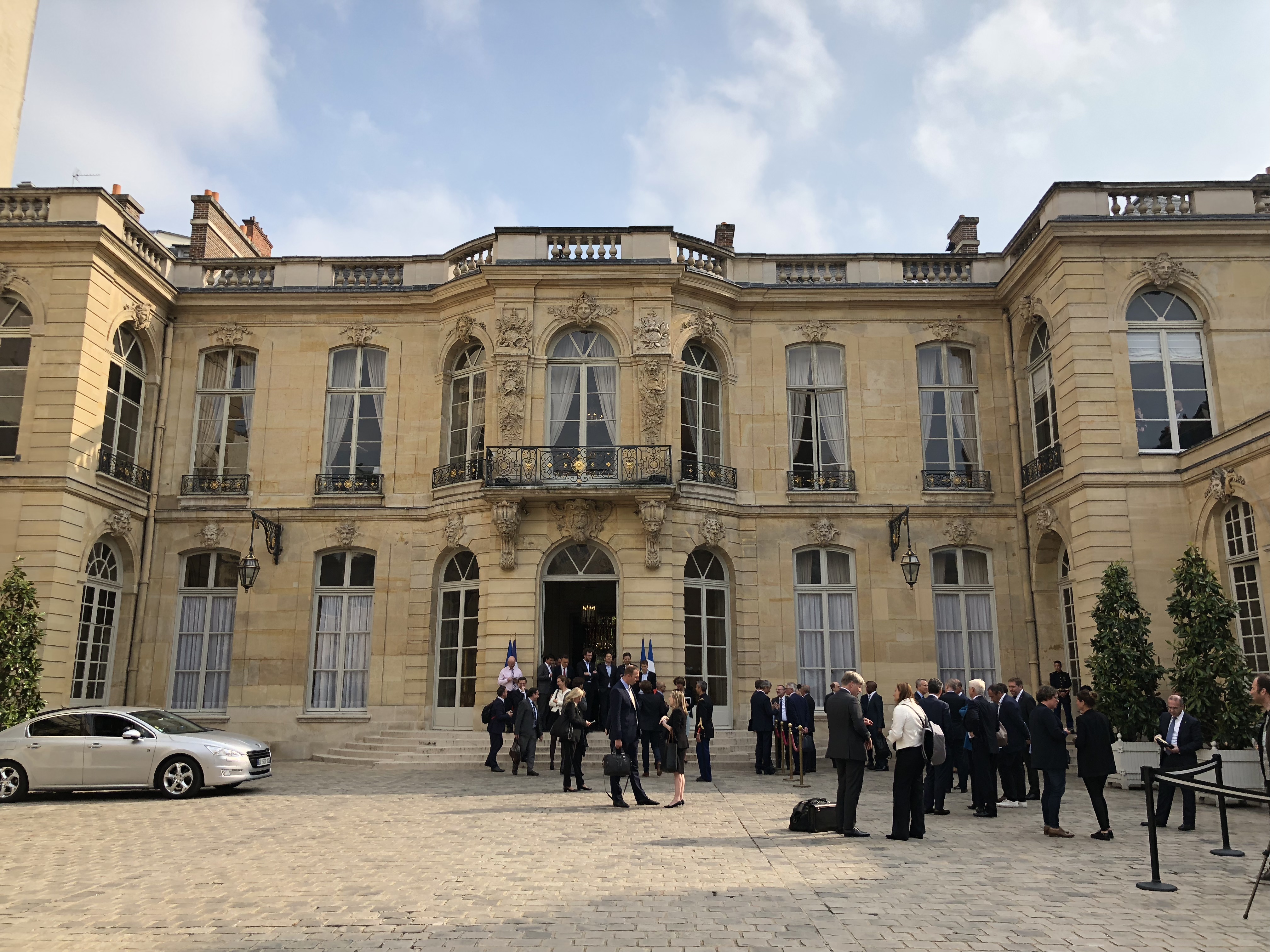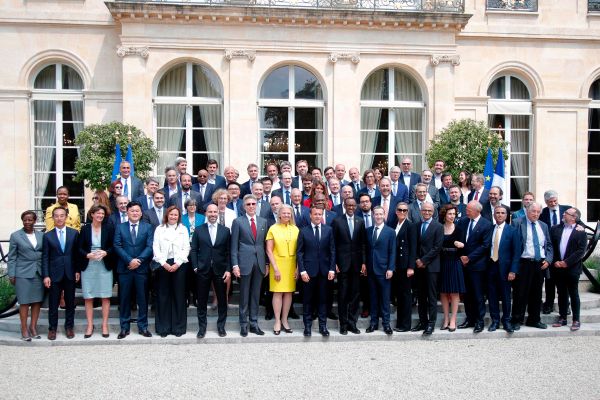Ahead of VivaTech, 50 tech CEOs came to Paris to have lunch with French President Emmanuel Macron. Then, they all worked together on “tech for good”. The event was all about leveraging tech around three topics — education, labor and diversity.
At the end of the day, French Prime Minister Édouard Philippe invited everyone for a speech in Matignon. It wasn’t a groundbreaking speech as Macron is also speaking at VivaTech tomorrow morning. “We’re trying to pivot France,” Philippe said.
With great power comes great responsibility Édouard Philippe
Maurice Lévy, the former CEO of Publicis, one of the two companies behind VivaTech with Les Échos, first introduced the event, as well as Eric Hazan from McKinsey. McKinsey worked on the data that was used to start those discussions. So let’s see what they talked about.
“As McKinsey showed, there’s no question that technology overall is a net creator of job and GDP. It’s a positive force,” Uber CEO Dara Khosrowshahi said. “At the same time, AI and automation, while driving the economy and productivity, […] will lead to large groups being disadvantaged.”
He then listed a few important points to make sure that nobody is going to be left behind, such as coaching and mentorship programs.
“This is not just the government’s job but it is also the job of private companies,” Khosrowshahi added.
He wanted to remain hopeful and it felt a bit like a lobbying effort. “It’s easy to see the lost of jobs because of automation. But it’s much more difficult to dream about the possibilities of the future,” he said. In other words, don’t worry about the on-demand economy, don’t worry about self-driving cars.
IBM CEO Ginni Rometty was in charge of the discussions around education. “We also had a lot of engineers and pragmatic people there. And we ended up with five recommendations,” she said.
It sounds like these recommendations would be really favorable for IBM and other tech companies. So here are these recommendations:
- Focus and segment this problem. Focus on the quarter of the population the most at risk.
- Align the skills that businesses need with the education system (hard skills and soft skills).
- There should be an open partnership with governments to reposition vocational education, learn by doing, foster internships, apprenticeships, simulations and redirect tax to incentivize.
- Work with teachers to pilot, get hard evidence and then scale.
- Retraining employees is the responsibility of all employers.
Finally, SAP CEO Bill McDermott talked about diversity. “As we looked at the facts, there are 33 percent more revenue, more profit for companies that got the memo on companies more inclusive and more diverse,” he said.
Culture, gender and geography were the main themes. But they also talked about differently able people. SAP will make an announcement around autism in France.

“Dara, Ginni and Bill, thank you for your introduction, that was brilliant, in English and concise,” French Prime Minister Édouard Philippe said.
He then listed three ideas that sum up his thinking about the tech industry.
“I truly believe in freedom, in that fundamental ability that you need to be able to take good decisions and bad decisions,” he said. The second idea is the consequence of that first one.
“With great power comes great responsibility. I think a modern philosopher called Peter Parker said that for the first time. And I really think it’s true.”
“While you don’t have to regulate on everything, when something isn’t regulated, it’s possible that it gets out of your control. And when it comes to the digital revolution and the data revolution, that freedom needs some boundaries. You know that Europe worked on some regulation — GDPR. What looked like regulation against innovation now appears as desirable and useful,” he said.
He then indirectly called out Facebook for its half-baked GDPR changes. “Some of you, and I believe it’s the case of Microsoft, decided to enforce GDPR everywhere. And I encourage everyone to do the same.”
The fact that 50 CEOs came to Paris is interesting by itself. It’s a sign that tech companies want to have an open discussion with governments. They want to make sure that regulation is favorable. On the other end, governments want to make sure that tech innovations aren’t going to divide society.
But it’s just starting.
Some companies announced a few things in Paris. Uber expanded its accident insurance to contractors across Europe, when they’re working and also when they’re not on the road. IBM plans to hire 1,800 people in France. Deliveroo is going to invest $117 million (€100 million) over the next few years.
Let’s see if Macron has more to say tomorrow.
Here’s the full list of tech CEOs in Paris for the Tech for Good Summit:
- Kevin Sneader, CEO, Mckinsey
- Audrey Azoulay, Director, UNESCO
- Mark Zuckerberg, Founder and CEO, Facebook
- John Kerry, Senior Fellow, Carnegie Foundation
- Satya Nadella , CEO, Microsoft
- Pierre Louette, CEO, Les Echos
- Tony Elumelu, President, United Bank for Africa
- Maurice Lévy, Co-Founder, Viva Technology
- Charlotte Hogg, CEO, Europe Visa
- Jean-Paul Agon, CEO, L’Oréal
- Tristan Harris, Executive Director, Center for Human technology
- Alexandre Dayon, CEO, Salesforce
- Brian Krzanich, CEO, Intel
- Mitchell Baker, President, Mozilla Foundation
- Yves Meignié, CEO, Vinci Energies
- Gilles Pelisson, CEO, TF1
- Bill McDermott, CEO, SAP
- Young Sohn, CEO, Samsung
- Gillian Tans, CEO, Booking.com
- Niklas Zennstrom, Founder and CEO, Atomico
- Will Shu, CEO, Deliveroo
- Sunil Bharti Mittal, President, Bharti enterprises
- Joe Schoendorf, Partner, Accel
- Nick Bostrom, Director, Future of Humanity Institute
- Julie Ranty, Director, VivaTech
- Eric Leandri, CEO, Qwant
- Olivier Brandicourt, CEO, Sanofi
- Mo Ibrahim, President, Mo Ibrahim Foundation
- Yossi Vardi, Entrepreneur
- Philippe Wahl, CEO, Groupe La Poste
- Pierre Nanterme, CEO, Accenture
- Tom Enders, CEO, Airbus
- Tim Hwang, Director, Harvard-MIT Ethics & Governance of AI Initiative
- Octave Klaba, Founder and CEO, OVH
- Ginni Rometty, CEO, IBM
- Pierre Dubuc, CEO, OpenClassrooms
- Isabelle Kocher, CEO, Engie
- Sy Lau, CEO, Tencent
- Xavier Niel, Founder, Iliad/Free
- Jimmy Wales, Founder, Wikimedia Foundation
- Jean-Laurent Bonnafé, CEO, BNP Paribas
- Angela Ahrendts, Vice President Retail, Apple
- Frédéric Mazella, Co-Founder and President, BlaBlaCar
- Stewart Butterfield, CEO, Slack
- Alex Karp, CEO, Palantir
- Guillaume Pepy, CEO, SNCF
- Jacquelline Fuller, President, Google.org
- Stéphane Richard, CEO, Orange
- Clare Akamanzi, CEO, Rwanda Development Board
- Paul Hermelin, CEO, CapGemini
- Eric Hazan, Senior Partner, McKinsey
- Ludovic Le Moan, Co-Founder and CEO, Sigfox
- Dara Khosrowshahi, CEO, Uber
- Catherine Guillouard, CEO, RATP
- Tim Collins, CEO, Ripplewood
- Bernard Liautaud, Partner, Balderton
- Alain Roumilhac, CEO, Manpower Group France
- Hiroshi Mikitani, CEO, Rakuten
- John Collison, Co-Founder and CEO, Stripe
- Maxime Baffert, Director, VivaTech
- Thomas Buberl, CEO, Axa
